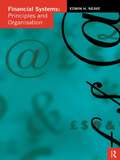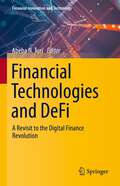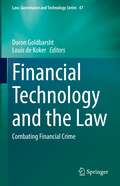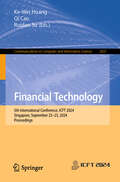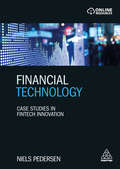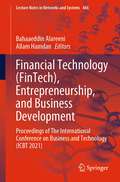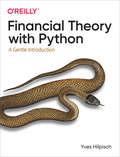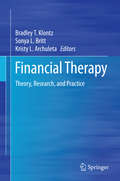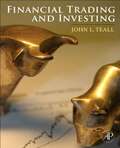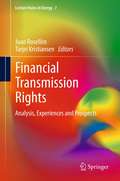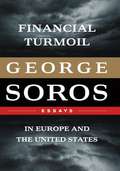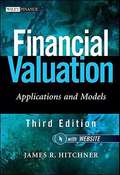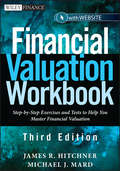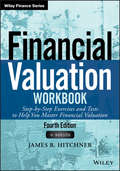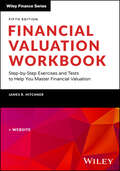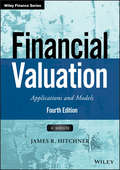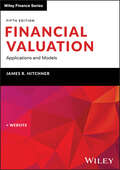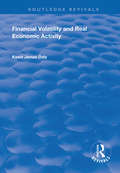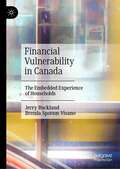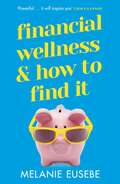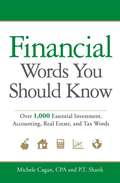- Table View
- List View
Financial Systems: Principles and Organization
by Edwin H. NeaveAs the world's financial markets become increasingly integrated and competitive Financial Systems: Principals and Organization offers an explanation of how and why change occurs. Data from four major financial systems are used to highlight principal financial system features. There is also a detailed exploration of the economic principles behind financial deals. It also offers: * Wider scope than other books on the subject making it an ideal introductory text * More up-to-date economic explanations * An international overview of US, Pacific and European economies This book has already been adopted by the Canadian Institute of Bankers for its financial systems course offered worldwide. Financial Systems will be invaluable reading for students and professionals alike.
Financial Technologies and DeFi: A Revisit to the Digital Finance Revolution (Financial Innovation and Technology)
by Abeba N. TuriThe hunt for new forms of value generation is shaping the future of economic and financial interactions, leading to the emergence of innovative business models and technological enablers. Other than challenging our time and space limits, such technological advancements, in some cases, have allowed the generation of value at nearly zero marginal cost. Inevitably, emergent tech solutions are fundamental game changers in digital and conventional finance. In this regard, the book fleshes out the core developments and trending fintech 2.0 solutions that pause challenges and bring opportunities for businesses and economies. It comprises nine main chapters with collective insights and interdisciplinary perspectives covering the business, tech, and regulatory layers of financial technologies and decentralized finance. Besides, the book illustrates how to leverage these state-of-the-art technologies for the evolving digital and decentralized finance world. The book targets a broad audience of researchers, academia, industry professionals, fintech enthusiasts, and the general business audience with timely data and up-to-date cases.
Financial Technology and the Law: Combating Financial Crime (Law, Governance and Technology Series #47)
by Doron Goldbarsht Louis De KokerBlockchains and cryptocurrencies, open banking, virtual assets, and artificial intelligence have become the buzzword of this decade. This book focuses on these ‘disruptive’ financial technologies that provide alternatives to the traditional financial services typically offered by regulated financial institutions. Financial technologies are characterized by the innovative ways in which they initiate, support or extend traditional financial services or offer alternative financial pathways and products. However, these financial technologies also pose money laundering and terrorist and proliferation financing as well as cyber security risks that require mitigation. This edited volume addresses a range of regulatory and enforcement challenges related to financial technology and financial crime. The book responds to the United Nations’ Sustainable Development Goals, in particular in relation to economic development, employment, national security, law enforcement and social well-being. Fostering responsible financial innovation promotes long-term economic growth, inclusion, and improved living standards. This book explores how to promote financial innovation while mitigating risks in a way that ensures financial prosperity and social inclusion.
Financial Technology: 5th International Conference, ICFT 2024, Singapore, September 23–25, 2024, Proceedings (Communications in Computer and Information Science #2437)
by Qi Cao Ruidan Su Ke-Wei HuangThis book constitutes the proceedings of the 5th International Conference on Financial Technology, ICFT 2024, held in Singapore during September 23–25, 2024. The 17 full papers presented in this volume were carefully reviewed and selected from 35 submissions. These papers focus on the current research in Blockchain technology, Financial technology and the application of Artificial Intelligence in these areas.
Financial Technology: Case Studies in Fintech Innovation
by Niels PedersenWith the continued success of fintech (financial technology) businesses around the world, financial services are becoming increasingly de-centralized, personalized, and automated. This new textbook strikes a balance between academic depth and commercial relevance in examining the advantages and challenges of these changes through the lens of various analytical frameworks. Financial Technology demystifies key technologies, such as blockchains, Internet of Things, AI, machine learning, and algorithmic data analysis, in a clear and accessible style suitable for readers with no technological background. Real-world case studies from a variety of international organizations including HSBC, ING, Amex, AIG, IBM, Tandem and Monzo, bridge the gap between theory and practice and contextualize learning in terms of real businesses, from large incumbents to smaller start-ups. With coverage of robo-advisors, mobile-only banks, open banking and risk and regulation, this book also explores a range of analytical frameworks to critically examine new technologies and emerging business models. Financial Technology enables readers to understand the fintech movement in the context of recent financial history, examine the key drivers of change and form insights about the financial system in a forward-looking and global manner. Online resources include PowerPoint slides for lecturers, video lectures, a literature review and blog posts to cover industry developments.
Financial Technology: Proceedings of The International Conference on Business and Technology (ICBT 2021) (Lecture Notes in Networks and Systems #486)
by Allam Hamdan Bahaaeddin AlareeniThis book constitutes the refereed proceedings of the International Conference on Business and Technology (ICBT2021) organized by EuroMid Academy of Business & Technology (EMABT), held in Istanbul, between 06–07 November 2021. In response to the call for papers for ICBT2021, 485 papers were submitted for presentation and inclusion in the proceedings of the conference. After a careful blind refereeing process, 292 papers were selected for inclusion in the conference proceedings from forty countries. Each of these chapters was evaluated through an editorial board, and each chapter was passed through a double-blind peer-review process.The book highlights a range of topics in the fields of technology, entrepreneurship, business administration, accounting, and economics that can contribute to business development in countries, such as learning machines, artificial intelligence, big data, deep learning, game-based learning, management information system, accounting information system, knowledge management, entrepreneurship, and social enterprise, corporate social responsibility and sustainability, business policy and strategic management, international management and organizations, organizational behavior and HRM, operations management and logistics research, controversial issues in management and organizations, turnaround, corporate entrepreneurship, innovation, legal issues, business ethics, and firm governance, managerial accounting and firm financial affairs, non-traditional research, and creative methodologies.These proceedings are reflecting quality research contributing theoretical and practical implications, for those who are wise to apply the technology within any business sector. It is our hope that the contribution of this book proceedings will be of the academic level which even decision-makers in the various economic and executive-level will get to appreciate.
Financial Terms Simplified
by Dr Gautam Majumdar MajumdarEver wondered what phrases like 'underwater mortgage', 'money mules', 'peer to peer lending', 'virtual key pad', 'bit coins' and many more such unique terms imply? This book attempts to add to the understanding of these words by giving their source of origin and evolution. It decodes and demystifies financial terminology which is genuinely complex and difficult to comprehend. Financial words and phrases are increasing by the day at the same pace at which developments in the financial world are taking place. Akin to the emergence of innovative financial transactions and mechanisms, there has been a glut of terms coined by financial practitioners and analysts whose meaning is not readily understood. Financial Terms Simplified covers terminology from the world of Banking, Insurance, Capital Markets and Finance. The terms have been culled from a range of literature with the emphasis being on presenting innovative terms in common usage. This book can be a useful dictionary for academics, students and finance professionals. Libraries of educational institutions, chambers of commerce and bank training colleges too will find this lexicon a handy reference.
Financial Theory with Python: A Gentle Introduction
by Yves HilpischNowadays, finance, mathematics, and programming are intrinsically linked. This book provides the relevant foundations of each discipline to give you the major tools you need to get started in the world of computational finance.Using an approach where mathematical concepts provide the common background against which financial ideas and programming techniques are learned, this practical guide teaches you the basics of financial economics. Written by the best-selling author of Python for Finance, Yves Hilpisch, Financial Theory with Python explains financial, mathematical, and Python programming concepts in an integrative manner so that the interdisciplinary concepts reinforce each other.Draw upon mathematics to learn the foundations of financial theory and Python programmingLearn about financial theory, financial data modeling, and the use of Python for computational financeLeverage simple economic models to better understand basic notions of finance and Python programming conceptsUse both static and dynamic financial modeling to address fundamental problems in finance, such as pricing, decision-making, equilibrium, and asset allocationLearn the basics of Python packages useful for financial modeling, such as NumPy, pandas, Matplotlib, and SymPy
Financial Therapy
by Kristy L. Archuleta Sonya L. Britt Bradley T. KlontzMoney-related stress dates as far back as concepts of money itself. Formerly it may have waxed and waned in tune with the economy, but today more individuals are experiencing financial mental anguish and self-destructive behavior regardless of bull or bear markets, recessions or boom periods. From a fringe area of psychology, financial therapy has emerged to meet increasingly salient concerns. Financial Therapy is the first full-length guide to the field, bridging theory, practical methods, and a growing cross-disciplinary evidence base to create a framework for improving this crucial aspect of clients' lives. Its contributors identify money-based disorders such as compulsive buying, financial hoarding, and workaholism, and analyze typical early experiences and the resulting mental constructs ("money scripts") that drive toxic relationships with money. Clearly relating financial stability to larger therapeutic goals, therapists from varied perspectives offer practical tools for assessment and intervention, advise on cultural and ethical considerations, and provide instructive case studies. A diverse palette of research-based and practice-based models meets monetary mental health issues with well-known treatment approaches, among them: Cognitive-behavioral and solution-focused therapies. Collaborative relationship models. Experiential approaches. Psychodynamic financial therapy. Feminist and humanistic approaches. Stages of change and motivational interviewing in financial therapy. A text that serves to introduce and define the field as well as plan for its future, Financial Therapy is an important investment for professionals in psychotherapy and counseling, family therapy, financial planning, and social policy.
Financial Trading And Investing
by John L. TeallA former member of the American Stock Exchange introduces trading and financial markets to upper-division undergraduates and graduate students who are planning to work in the finance industry. Unlike standard investment texts that cover trading as one of many subjects, Financial Trading and Investing gives primary attention to trading, trading institutions, markets, and the institutions that facilitate and regulate trading activities—what economists call "market microstructure." The text will be accompanied by a website that can be used in conjunction with TraderEx, Markit, StocklinkU, Virtual Trade, Vecon Lab Experiment, Tradingsim, IB Student Trading Lab, Brenexa, Stock Trak and How the Market Works. Introduces the financial markets and the quantitative tools used in them so students learn how the markets operate and gain experience with their principal tools Helps students develop their skills with the most popular trading simulation programs so they can reuse the book to solve day-to-day problems Stretches from investor behavior to hedging strategies and noise trading, capturing recent advances in an up-to-date reference source
Financial Transmission Rights
by Tarjei Kristiansen Juan RosellónWhilst financial rights have appeared as a successful ingredient in North-American power markets, they have their shortcomings both theoretically and in practice. Financial Transmission Rights: Analysis, Experiences and Prospects present a systematic and comprehensive overview of financial transmission rights (FTRS). Following a general introduction to FTRs, including chapters to explain transmission pricing and the general properties of FTRS, experts in the field provide discussions on wide scope of topics. These include: Varying perspectives on FTRS: from electrical engineers to economists, Different mathematical formulations of FTRS Financial Hedging using FTRS, and Alternative solutions to FTRs The detail, expertise and range of content makes Financial Transmission Rights: Analysis, Experiences and Prospect an essential resource for electricity market specialists both at academic and professional levels. "This is THE BOOK we were all expecting to address all key 'Financial Transmission Rights' issues. It is comprehensive and reader friendly. You can pick at will in its menu: more or less theory, a bit of maths or none, empirical review of real cases or numerical simulations of many feasible options. Big names rally there to delight you like: Hogan , Oren, Perez-Arriaga, Smeers, Hobbs and... Rosellón. More than a must read: a light house, a map and a survival kit." Jean - Michel Glachant, Director Florence School, Holder Loyola de Palacio Chair, Chief-editor Economics of Energy & Environmental Policy. "In the last two decades, economists have developed a better understanding of the impact of financial rights on risk management, market power and network expansion in electricity markets, while power systems have experimented with such rights. Striking a good balance between academics and practitioners, always at the frontier of the field, written by the best experts, this volume is essential reading for all those- power systems' managers and users, regulators, students and researchers- who want to understand the new electricity environment and predict its evolution." Jean Tirole, Toulouse School of Economics and Institute for Industrial Economics (IDEI) Further comments inside.
Financial Transparency: Our Ultimate Goal
by John Case Karen Berman Joe KnightIn this chapter, the authors discuss what an organization might gain by fostering a culture of true financial transparency and intelligence.
Financial Turmoil in Europe and the United States: Essays
by George SorosThe dire economic situation we find ourselves in is not a result of economic forces alone, but of the policies pursued, and not pursued, by world leaders. In this collection of his recent writings on the global financial situation, George Soros presents his views and analysis of key economic policy choices leading up to, during, and following the financial crisis of 2008-2009. Soros explores domestic and international policy choices like how to manage the (then) potential implosion of Fannie Mae & Freddie Mac, deploying measures to stem global contagion from the sub-prime crisis, alternative options on bailing out lesser developed countries and why this was vital, the structural problems of European economic management, and more. Financial Turmoil in Europe and the United States elegantly distills the choices at hand, and takes the reader on a journey of real time economic policy work and experimentation.
Financial Valuation
by James R. HitchnerReal world applications and professional consensus by nationally recognized valuation experts Filled with a wealth of detail, practice tips, and examples, Financial Valuation: Applications and Models, Third Edition brings together thirty nationally recognized names in the valuation industry hailing from a variety of professional specializations-including accounting, business appraisal, and financial analysis-to provide practitioners with an indispensable reference on various valuation issues. Assembled by valuation authority James Hitchner, these contributors analyze, explain, and collaborate on the most effective valuation procedures to share real-world applications in the field of financial valuations. Written by 30 top experts in business valuations field Provides the valuation theory, the consensus view on application, and then the tools to apply it An all-encompassing valuation handbook that presents the application of financial valuation theory for business appraisers and consultants New chapters on Assessing Risk and Expert Witness Testimony Expands chapter on Cost of Capital Comprehensive in coverage and authoritative in treatment, James Hitchner's Financial Valuation, Third Edition provides trusted, complete business valuation information for CPAs, appraisers, analysts, attorneys, and corporate executives.
Financial Valuation Workbook
by James R. Hitchner Michael J. MardThe resource that cuts the learning curve in half for valuation professionals Now valuation professionals can master almost every function for most valuation situations. The Financial Valuation Workbook, Third Edition guides readers through a complete business valuation with essential tools for quick reference. Updated and expanded chapter on The Process of Preparing a Valuation- Client Workflow Procedures from initial phone call to delivery of the report Expanded case study and exercises with solutions and explanations Over 300 exercises organized by major areas to increase the learning process This Workbook is organized by standard, easily identifiable sections that allow for easy reference by all professionals.
Financial Valuation Workbook: Step-by-Step Exercises and Tests to Help You Master Financial Valuation
by James R. HitchnerPractical valuation exercises with real-world application and expert insight Financial Valuation Workbook cuts the learning curve in half, with practical training for use with any valuation textbook. Packed with tools, resources, and over 300 exercises, this book helps novices get a handle on the complex valuation process, while helping more experienced practitioners organize their engagements. Checklists, flowcharts, reports, information requests, and other resources help streamline the workflow and ensure thorough review, while in-depth coverage places the complexities of the field front-and-center. This new fourth edition features a brand new expanded case study for real-world insight, accompanied by exercises with explanations that deepen the learning process. Expert tips are highlighted throughout to provide additional insight in specific situations, and exercises from basic to advanced map to established training processes. Valuation is as an art, as well as a science, and simply reading a textbook only goes halfway toward true learning—applying what you learn is critical. This book provides hands-on practice alongside useful tools and valuable insight to help solidify your understanding of the many facets of this complex field. Delve into the intricacies of valuation with a new expanded case study and expert tips Follow checklists and flowcharts for each phase of the valuation process Use reports, information requests, and other tools that help organize your workflow Test your understanding with over 300 exercises organized by major area Organized into standard, recognized, and easily identified sections that lend themselves to quick refreshers as well as start-to-finish study, this book is a truly useful resource for beginner and veteran alike. Whether you're learning valuation for the first time or simply need guidance on an unfamiliar situation, Financial Valuation Workbook provides a key resource for any business valuation professional.
Financial Valuation Workbook: Step-by-Step Exercises and Tests to Help You Master Financial Valuation (Wiley Finance)
by James R. HitchnerA complete toolkit for financial valuators to help keep their engagements on-track and on-time In the newly revised fifth edition of Financial Valuation Workbook: Step-by-Step Exercises and Tests to Help You Master Financial Valuation, veteran valuation expert James R. Hitchner delivers a comprehensive collection of checklists, reports, information request templates, and other tools designed to assist valuation practitioners in the organization of their engagements. In the book, you'll find intuitively organized materials that cut the learning curve for newly minted valuation professionals in half. The tools contained within follow the standard valuation engagement format and track the intricacies of the typical valuation assignment. Over 300 exercises—organized by major subject—are included to assist with the learning process. You'll also find: Updated sections on S-corps, discounts for lack of marketability, and cost of capital resources and applications Report writing aids, discussions of individual vs. corporate tax rates, and guides for engaging in depositions and trials as an expert witness Materials designed to assist with the difference between capitalized cash flow and discounted cash flow methods Perfect for business valuation analysts and expert witnesses, Certified Public Accountants, and appraisers, the Financial Valuation Workbook will also be an indispensable resource for attorneys working with financial valuation experts as they aim to keep their engagements on-track, on-time, and on-budget.
Financial Valuation: Applications and Models (Wiley Finance #332)
by James R. HitchnerA practically-focused resource for business valuation professionals Financial Valuation: Applications and Models provides authoritative reference and practical guidance on the appropriate, defensible way to prepare and present business valuations. With contributions by 30 top experts in the field, this new fourth edition provides an essential resource for those seeking the most up-to-date guidance, with a strong emphasis on applications and models. Coverage includes state-of-the-art methods for the valuation of closely-held businesses, nonpublic entities, intangible, and other assets, with comprehensive discussion on valuation theory, a consensus view on application, and the tools to make it happen. Packed with examples, checklists, and models to help you navigate your valuation project, this book also provides hundreds of expert "tips" and best practices in clear, easy-to-follow language. The companion website provides access to extensive appendix materials, and the perspectives of valuation thought-leaders add critical insight throughout each step of the process. Valuation is an important part of any organization's overall financial strategy, and seemingly-small inaccuracies or incomplete assessments can have big repercussions. This book walks you through the valuation process to give you the skills and understanding you need to get it done right. Learn best practices from 30 field-leading experts Follow clear examples for complex or unfamiliar scenarios Access practical tools that streamline the valuation process Understand valuation models and real-world applications The business valuation process can become very complex very quickly, and there's no substitute for clear guidance and a delineated framework in the run-up to completion. Get organized from the beginning, and be systematic and methodical every step of the way. Financial Valuation: Applications and Models is the all-encompassing, expert guide to business valuation projects.
Financial Valuation: Applications and Models, Book + Website (Wiley Finance)
by James R. HitchnerA comprehensive guide to the theory and application of valuation, along with useful models, tools, and tips for analysts Financial Valuation: Applications and Models provides authoritative reference and practical guidance on the appropriate, defensible way to prepare and present business valuations. With contributions by 30 top experts in the field, this updated edition provides an essential resource for those seeking the most up-to-date methods, with a strong emphasis on applications and models. Coverage includes the latest approaches to the valuation of closely held businesses, nonpublic entities, intangibles, and other assets, with comprehensive discussion on valuation theory, a consensus view on application, and the tools to make it happen. This 5th edition has been revised throughout, introducing new and extended coverage of essential topics like: S Corps, discounts for lack of marketability, cost of capital resources, cash flow methods, depositions and trials, and more. Packed with examples, checklists, and models to help navigate valuation projects, this book is an excellent practical tool for working professionals. It also provides hundreds of expert tips and best practices in clear, easy-to-follow language. The companion website provides access to extensive appendix materials, and the perspectives of valuation thought leaders add critical insight. Learn the art and science of estimating the value of businesses, including closely held businesses and nonpublic entities Determine the monetary value of intangible assets like goodwill, intellectual property, and brand recognition Update your knowledge with the latest valuation methods, approaches, and tools Use checklists, templates, models, and examples to make your valuations easierBusiness valuation analysts, CPAs, appraisers, and attorneys—as well as anyone aspiring to those careers—will appreciate the comprehensive theory and thorough practical guidance in Financial Valuation: Applications and Models.
Financial Volatility and Real Economic Activity
by Kevin DalyPublished in 1999. The issue of financial volatility, especially since financial deregulation, has given rise to concerns regarding the effects of increased financial volatility on real economic activity. Two issues represent a substantial challenge to financial economists with respect to these concerns. The first relates to the identification of the causes of increased volatility in financial markets. Identification is a first step towards increasing both financial economists' and policy-makers' understanding of the interrelated causes of financial volatility. The second requires linking the effects of increased financial volatility to the real sector of the economy by examining the channels through which financial volatility influences fundamental economic variables. In order to address these two issues, the analysis initially develops and estimates a model which is capable of explaining the financial and business cycle determinates of movements in the conditional volatility of the Australian All Industrials stock market index. Evidence suggests that a significant linkage exists between the conditional volatility of the money supply. Models are then developed to examine how monetary volatility is transmitted to the volatility of financial asset prices, inflation and real output in an open economy. The results indicate that while financial volatility has increased to some extent since the late 1980s, this has been transferred non-uniformly towards increasing volatility of both real and financial activity.
Financial Vulnerability in Canada: The Embedded Experience of Households
by Jerry Buckland Brenda Spotton VisanoThis book examines financial vulnerability: a state in which a person or household cannot absorb any substantial spending or negative income shock without substantial financial and ultimately broader harm such as job loss, emotional harm, or mental illness. The focus of the book is on the experiences of low- income and modest income Canadian families – families which, by virtue of being in the lower income brackets, are particularly at risk of experiencing financial hardship. Looking at vulnerability from a conceptual and empirical lens, this book offers a framework to better understand the complex and interdependent ways in which financial vulnerability emerge and can be addressed. By locating its analysis of individual and household financial management in wider community, cultural, and economic contexts, this book seeks to offer holistic policy recommendations to reduce financial vulnerability, with implications that go beyond Canada and to other developed countries.
Financial Wellness and How to Find It
by Melanie Eusebe'Fascinating' Stylist magazine'A powerful reminder that we cannot discuss 'wellness' without also talking about the elephant in the room: money. This book isn't just about getting reconnected with a helpful app or spreadsheet but something much more important than that: it will inspire you to reconnect with yourself.' Emma GannonFinancial Wellness and How to Find It takes finance out of the business pages and into our personal lives. It tells us that the way we think about money has a lot to do with the way we think about ourselves, and the stories we believe about what we deserve.When you feel bad about money, it's hard to feel good about life. We focus on health and wellness as essential for happiness, but so often we choose to bury our heads in the sand when it comes to taking positive action over our finances. Financial wellness doesn't mean being rich, having a portfolio of stocks and shares, or being #debtfree. It's about understanding your emotions around money, knowing who you can turn to for support and being aware of your subconscious beliefs about self-worth.Melanie Eusebe, founder of Money Moves, shares the tools and resources you need to reset your relationship with money, and take charge of your financial happiness, whatever your situation, and regardless of the economy.Financial Wellness and How to Find It is empowering and essential reading for anyone who ever earned a paycheque (and spent it).
Financial Wellness and How to Find It
by Melanie Eusebe'Fascinating' Stylist magazine'A powerful reminder that we cannot discuss 'wellness' without also talking about the elephant in the room: money. This book isn't just about getting reconnected with a helpful app or spreadsheet but something much more important than that: it will inspire you to reconnect with yourself.' Emma GannonFinancial Wellness and How to Find It takes finance out of the business pages and into our personal lives. It tells us that the way we think about money has a lot to do with the way we think about ourselves, and the stories we believe about what we deserve.When you feel bad about money, it's hard to feel good about life. We focus on health and wellness as essential for happiness, but so often we choose to bury our heads in the sand when it comes to taking positive action over our finances. Financial wellness doesn't mean being rich, having a portfolio of stocks and shares, or being #debtfree. It's about understanding your emotions around money, knowing who you can turn to for support and being aware of your subconscious beliefs about self-worth.Melanie Eusebe, founder of Money Moves, shares the tools and resources you need to reset your relationship with money, and take charge of your financial happiness, whatever your situation, and regardless of the economy.Financial Wellness and How to Find It is empowering and essential reading for anyone who ever earned a paycheque (and spent it).
Financial Wellness and How to Find It: No matter what the economy’s doing
by Melanie Eusebe'Fascinating' Stylist magazine'A powerful reminder that we cannot discuss 'wellness' without also talking about the elephant in the room: money. This book isn't just about getting reconnected with a helpful app or spreadsheet but something much more important than that: it will inspire you to reconnect with yourself.' Emma GannonFinancial Wellness and How to Find It takes finance out of the business pages and into our personal lives. It tells us that the way we think about money has a lot to do with the way we think about ourselves, and the stories we believe about what we deserve.When you feel bad about money, it's hard to feel good about life. We focus on health and wellness as essential for happiness, but so often we choose to bury our heads in the sand when it comes to taking positive action over our finances. Financial wellness doesn't mean being rich, having a portfolio of stocks and shares, or being #debtfree. It's about understanding your emotions around money, knowing who you can turn to for support and being aware of your subconscious beliefs about self-worth.Melanie Eusebe, founder of Money Moves, shares the tools and resources you need to reset your relationship with money, and take charge of your financial happiness, whatever your situation, and regardless of the economy.Financial Wellness and How to Find It is empowering and essential reading for anyone who ever earned a paycheque (and spent it).
Financial Words You Should Know: Over 1,000 Essential Investment, Accounting, Real Estate, and Tax Words
by P. T. Shank Michele CaganLearn the language of money! Having trouble understanding your accountant during tax season? Not sure how what’s really going on in the economy affects you? Confused by the insider lingo of the stock market? Don’t let perplexing financial jargon hold you back from making smart money choices and protecting your investments. From secondary market and controlling interest to assumable mortgage and double taxation, this comprehensive reference explains the most important terms in plain English. Each entry comes complete with definitions, pronunciations keys, and examples of usage to help clarify even the most complex financial concepts. With Financial Words You Should Know, you can walk the talk of the financial world—and make money doing it.
